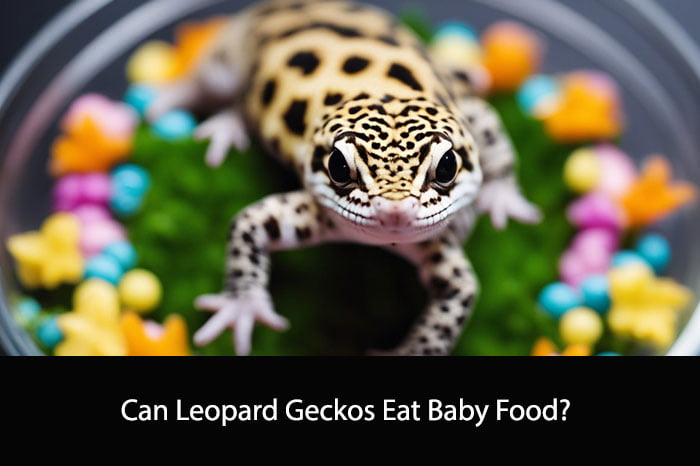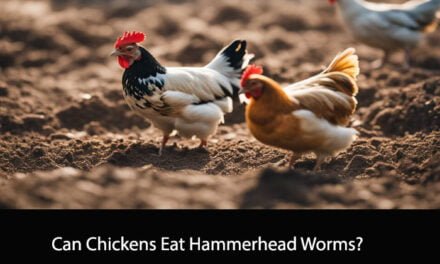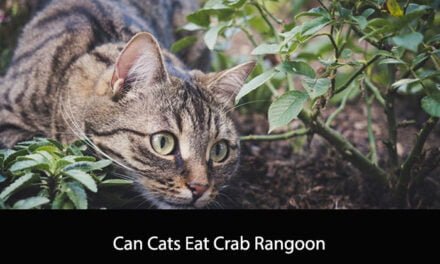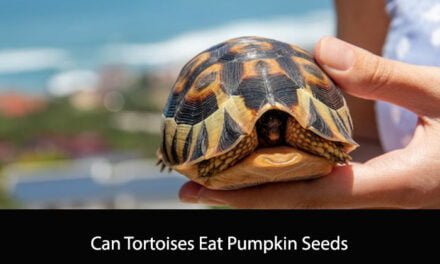Leopard geckos are popular pets that are known for their unique appearance and docile nature. As with any pet, it’s important to provide them with a well-rounded diet to ensure their health and wellbeing. While there are many commercial diets available for leopard geckos, some owners may wonder if baby food can be incorporated into their diet.
Baby food is a popular choice for many pet owners as it’s easy to prepare and comes in a variety of flavors. However, leopard geckos have specific dietary requirements that must be met in order for them to thrive. In this article, we’ll explore whether or not leopard geckos can eat baby food and what considerations should be taken into account before incorporating it into their diet.
Dietary Basics of Leopard Geckos
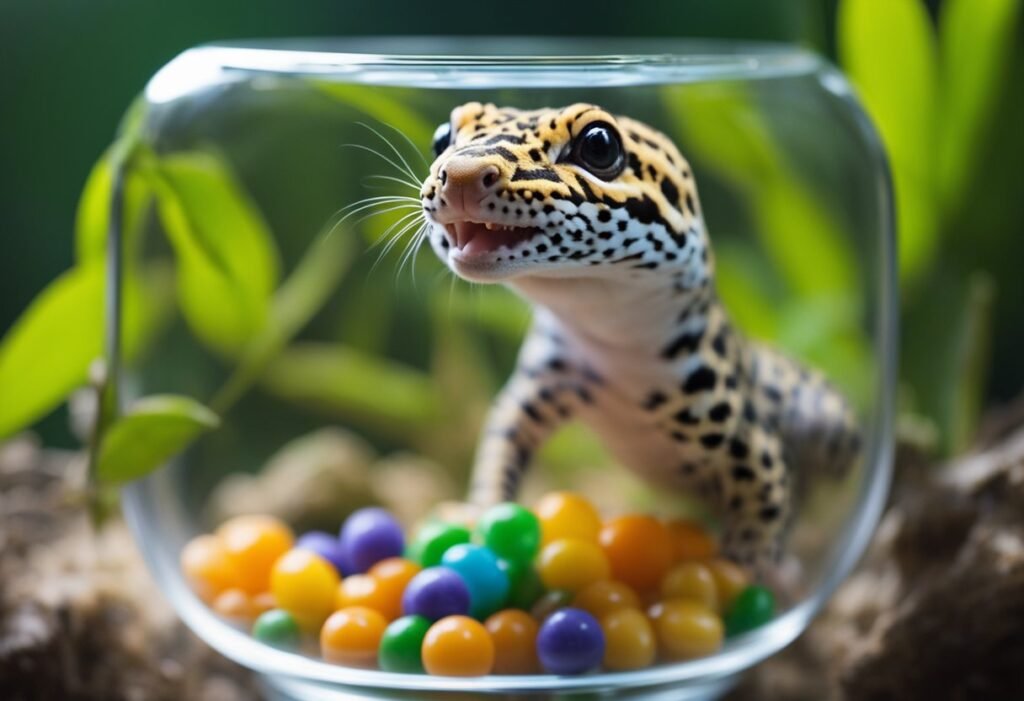
As caretakers of leopard geckos, it is important to understand their dietary needs in order to maintain their health and well-being. Leopard geckos are insectivores, which means that they primarily eat insects. However, it is important to provide a variety of insects to ensure that they receive a balanced diet.
The size of the insects should match the size of the gecko. Adult geckos can eat larger insects such as crickets, mealworms, and superworms, while baby geckos should be fed smaller insects such as pinhead crickets and small mealworms.
It is also important to provide a calcium supplement for leopard geckos. Calcium is necessary for their bone health and can be provided through a calcium powder that is dusted on their insects before feeding.
While leopard geckos primarily eat insects, it is important to note that they should not be fed fruits, vegetables, or baby food. These foods do not provide the necessary nutrients for leopard geckos and can cause digestive issues.
In summary, providing a variety of appropriately sized insects and a calcium supplement is essential for the health and well-being of leopard geckos. Avoid feeding them fruits, vegetables, or baby food to ensure they receive a balanced diet.
Understanding Baby Food

When it comes to feeding our leopard geckos, we always want to make sure we give them the best possible nutrition. One option that some gecko owners consider is baby food. Baby food is a soft, pureed food that is typically made for human infants. But can leopard geckos eat baby food?
Before we answer that question, let’s first understand what baby food is. Baby food is made from a variety of fruits, vegetables, and meats that are cooked and pureed into a smooth consistency. Some baby foods may also contain added vitamins and minerals to ensure that infants receive proper nutrition.
When choosing baby food for your leopard gecko, it’s important to read the ingredients carefully. Look for baby foods that are made from natural, whole foods without any added sugars or preservatives. Avoid baby foods that contain onions, garlic, or other ingredients that may be harmful to your gecko.
It’s also important to note that baby food should not be the sole source of nutrition for your leopard gecko. While it may be a good option for a treat or occasional supplement, it should not replace a balanced diet of live insects and other appropriate foods.
In conclusion, while baby food may be a safe and healthy option for human infants, it may not be the best choice for your leopard gecko. Always consult with a veterinarian or reptile expert before introducing any new foods to your gecko’s diet.
Pros and Cons of Baby Food for Leopard Geckos
Nutritional Value
Baby food can be a convenient and easy option for feeding leopard geckos. It is often fortified with vitamins and minerals, which can provide a balanced diet for your pet. Some baby foods are also made with fruits and vegetables, which can add variety to your gecko’s diet.
However, it is important to note that baby food is not a complete replacement for a gecko’s regular diet. It lacks the necessary protein and fat content that leopard geckos require for optimal health. Therefore, it should only be used as a supplement to their regular diet.
Potential Health Risks
While baby food can have some nutritional benefits, there are also potential health risks to consider. Some baby foods contain additives, such as preservatives and artificial flavors, that can be harmful to leopard geckos. These additives can cause digestive issues and even lead to long-term health problems.
It is also important to check the ingredients list for any potential allergens, such as soy or wheat, which can cause adverse reactions in leopard geckos.
Overall, baby food can be a convenient and nutritious option for feeding leopard geckos, but it should be used in moderation and with caution. It is always best to consult with a veterinarian or reptile specialist before making any significant changes to your gecko’s diet.
Appropriate Foods for Leopard Geckos
Leopard geckos are insectivores, which means that their diet primarily consists of live prey. In addition to live prey, leopard geckos can also eat commercial diets and small amounts of vegetables and fruits.
Live Prey
Live prey is an essential part of a leopard gecko’s diet. It provides the necessary nutrients and satisfies their hunting instincts. The following are some live prey options that are appropriate for leopard geckos:
- Crickets
- Mealworms
- Dubia Roaches
- Waxworms (as an occasional treat)
It is essential to provide gut-loaded insects to ensure that the leopard gecko is getting the necessary nutrients. Gut-loading refers to feeding the insects a nutritious diet before feeding them to the gecko.
Commercial Diets
Commercial diets are another option for feeding leopard geckos. These diets come in the form of pellets or powders that are mixed with water. They are convenient and provide a balanced diet for the gecko. However, they should not be the sole source of the gecko’s diet.
Vegetables and Fruits
Leopard geckos can also eat small amounts of vegetables and fruits. These should be offered as occasional treats and not as a primary food source. Some appropriate options include:
- Carrots
- Squash
- Apples
- Berries
It is essential to note that leopard geckos have specific dietary needs, and their diet should be carefully monitored to ensure that they are getting the necessary nutrients.
Feeding Techniques for Leopard Geckos

Leopard geckos are insectivorous reptiles, which means they primarily feed on insects. However, some owners may wonder if they can feed their leopard geckos baby food as a treat or supplement. While some baby food may be safe for leopard geckos, it is important to understand their feeding habits and dietary requirements.
Frequency of Feeding
Leopard geckos should be fed once a day, preferably at night when they are most active. Baby geckos may require more frequent feedings, up to twice a day. It is important to establish a feeding schedule and stick to it to prevent overfeeding or underfeeding.
Quantity and Portion Control
Leopard geckos should be fed an appropriate amount of food based on their size and age. As a general rule, feed them as many insects as they can eat in 10-15 minutes. Avoid overfeeding, as this can lead to obesity and other health problems.
When feeding leopard geckos baby food, it is important to control the portion size. Baby food should not replace their regular diet of insects. Offer a small amount of baby food as a treat or supplement, no more than once a week. Choose baby food that is high in protein and low in sugar and fillers.
Overall, leopard geckos should primarily be fed a diet of live insects. Baby food can be offered as a supplement or treat, but should not replace their regular diet. By understanding their feeding habits and dietary requirements, we can ensure our leopard geckos stay healthy and happy.
Identifying Quality Baby Food
When it comes to feeding leopard geckos, baby food can be a convenient and nutritious option. However, not all baby food is created equal. Here are some key factors to consider when selecting baby food for your leopard gecko.
Ingredients to Look For
When selecting baby food for your leopard gecko, it is important to choose products that are made with high-quality ingredients. Look for baby foods that contain:
- Meat-based proteins: Leopard geckos are carnivorous and require a diet that is high in protein. Look for baby foods that contain meat-based proteins such as chicken, turkey, or beef.
- Vegetables: While leopard geckos are primarily meat-eaters, they can benefit from the addition of vegetables in their diet. Look for baby foods that contain vegetables such as sweet potatoes, carrots, and squash.
- Calcium and Vitamin D: Calcium and Vitamin D are important nutrients for leopard geckos, as they help to support bone health. Look for baby foods that are fortified with these nutrients.
Ingredients to Avoid
Not all baby food is suitable for leopard geckos. Avoid baby foods that contain:
- Grains: Leopard geckos are not able to digest grains and should not be fed baby foods that contain rice, wheat, or other grains.
- Added sugars: Baby foods that contain added sugars can be harmful to leopard geckos and should be avoided.
- Artificial preservatives: Some baby foods contain artificial preservatives such as BHA and BHT, which can be harmful to leopard geckos. Look for products that are free from these additives.
By selecting high-quality baby food products that are made with the right ingredients, you can provide your leopard gecko with a nutritious and balanced diet.
Health Monitoring
As responsible pet owners, it is important to monitor the health of our leopard geckos regularly. In addition to providing a balanced diet, we should also be aware of any signs of nutritional deficiency or overfeeding concerns.
Signs of Nutritional Deficiency
Leopard geckos require a diet high in protein and calcium to maintain their health. If they are not receiving adequate nutrition, they may display signs of nutritional deficiency such as:
- Weight loss
- Lack of appetite
- Weakness or lethargy
- Stunted growth
- Metabolic bone disease
If you notice any of these signs, it is important to consult with a veterinarian who specializes in reptiles. They can help diagnose the problem and provide advice on how to correct it.
Overfeeding Concerns
While it may be tempting to give our leopard geckos a variety of treats, overfeeding can lead to health problems such as obesity and digestive issues. It is important to provide a balanced diet and limit treats to small amounts.
We should also monitor our geckos’ weight regularly to ensure they are not gaining too much weight. If you notice your gecko is becoming overweight, it may be necessary to adjust their diet and provide more opportunities for exercise.
By monitoring our leopard geckos’ health regularly, we can ensure they are receiving the proper nutrition and prevent health problems from developing.
Expert Recommendations
When it comes to feeding leopard geckos, it’s important to provide them with a balanced diet that meets their nutritional needs. While baby food may seem like a convenient option, it’s important to consider whether it’s appropriate for these reptiles.
After consulting with experts in the field, we recommend avoiding baby food as a primary source of nutrition for leopard geckos. While some baby foods may contain ingredients that are safe for geckos, they are often lacking in essential nutrients such as calcium and vitamin D3 that are necessary for healthy bone growth and development.
Instead, we recommend feeding leopard geckos a diet that consists primarily of insects such as crickets, mealworms, and dubia roaches. These insects can be dusted with a calcium and vitamin D3 supplement to ensure that geckos are receiving the nutrients they need.
In addition to insects, leopard geckos can also benefit from occasional feedings of other protein sources such as pinkie mice or waxworms. However, it’s important to avoid overfeeding these high-fat foods as they can lead to obesity and other health issues.
Overall, while baby food may seem like a convenient option, it’s important to prioritize the nutritional needs of leopard geckos and provide them with a varied diet that includes insects and other appropriate protein sources.
Alternative Food Options

As we discussed earlier, leopard geckos are insectivores and require a diet that is high in protein. However, there are some alternative food options that can be added to their diet for variety and nutritional benefits.
Baby Food
While it is not recommended to solely rely on baby food as a staple diet for leopard geckos, it can be used as a supplement to their regular diet. Baby food is a good source of vitamins and minerals, and can provide additional hydration for your gecko.
When choosing baby food, it is important to select a flavor that is appropriate for your gecko’s taste preferences. Some popular options include chicken, turkey, and beef. It is also important to check the ingredients list for any added sugars or artificial preservatives, as these can be harmful to your gecko.
To feed your gecko baby food, simply place a small amount on a shallow dish and offer it to them. It is important to monitor their intake and ensure that they are still consuming their regular diet of insects.
Vegetables
While leopard geckos are primarily carnivorous, they can benefit from the addition of vegetables to their diet. Vegetables provide important vitamins and minerals, as well as fiber to aid in digestion.
Some suitable vegetables for leopard geckos include carrots, squash, and leafy greens such as kale and spinach. It is important to finely chop or puree the vegetables before offering them to your gecko, as they may have difficulty digesting larger pieces.
When introducing vegetables to your gecko’s diet, it is important to start with small amounts and gradually increase the quantity over time. It is also important to monitor their intake and ensure that they are still consuming their regular diet of insects.
Commercial Diets
There are also commercial diets available specifically formulated for leopard geckos. These diets typically contain a blend of insects and other protein sources, as well as vitamins and minerals to ensure a balanced diet.
When choosing a commercial diet, it is important to select a high-quality brand that does not contain any fillers or artificial preservatives. It is also important to monitor your gecko’s intake and ensure that they are still consuming their regular diet of insects.
Overall, while leopard geckos require a diet that is high in protein, there are some alternative food options that can be added to their diet for variety and nutritional benefits. It is important to always monitor their intake and ensure that they are consuming a balanced diet.
Frequently Asked Questions
Is baby food safe for leopard geckos to consume?
Baby food is not recommended as a primary food source for leopard geckos. While some types of baby food may contain nutrients that are beneficial for leopard geckos, they are not formulated to meet their specific dietary needs. Additionally, many types of baby food contain additives and preservatives that can be harmful to leopard geckos.
What are the dietary risks of feeding chicken to leopard geckos?
Chicken should be avoided as a food source for leopard geckos. Chicken contains high levels of phosphorus and low levels of calcium, which can lead to metabolic bone disease in leopard geckos. Additionally, chicken can be contaminated with harmful bacteria such as salmonella, which can be dangerous for leopard geckos.
What types of food should be avoided when feeding leopard geckos?
Leopard geckos should not be fed foods that are high in fat or low in calcium. Foods that are high in oxalates, such as spinach and kale, should also be avoided as they can bind to calcium and prevent its absorption. In addition, leopard geckos should not be fed insects that are too large as they can cause digestive problems.
Which live foods are suitable for baby leopard geckos?
Baby leopard geckos can be fed small live insects such as pinhead crickets, fruit flies, and small mealworms. These insects should be dusted with a calcium supplement before feeding to ensure that the gecko is getting enough calcium.
Can leopard geckos be given fruit as part of their diet?
While leopard geckos can eat fruit, it should not be a significant part of their diet. Fruit is high in sugar and can lead to obesity and other health problems if fed in excess. Leopard geckos should primarily be fed a diet of live insects and occasional small amounts of vegetables.
What is the appropriate diet for a newborn leopard gecko?
Newborn leopard geckos should be fed small live insects such as pinhead crickets and fruit flies. These insects should be dusted with a calcium supplement before feeding. It is important to ensure that the insects are small enough for the gecko to eat easily and that they are fed multiple times a day to ensure that the gecko is getting enough food.

